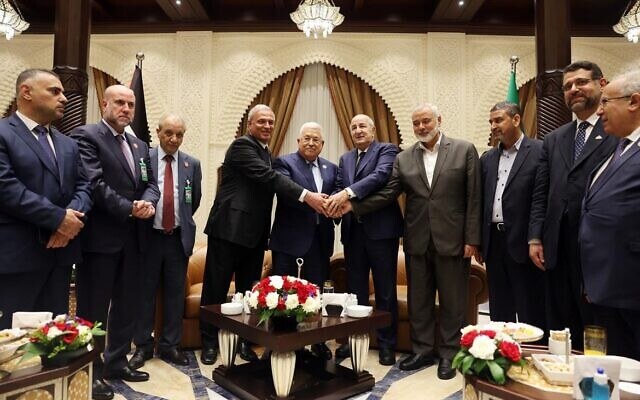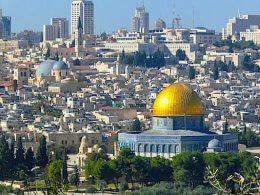The long-estranged leaders of Hamas and Fatah held their first face-to-face meeting in several years in Algeria on Tuesday, potentially signaling new efforts to broker reconciliation talks between the warring factions.
Palestinian Authority President Mahmoud Abbas and Hamas chief Ismail Haniyeh are both in Algeria this week attending festivities marking the country’s 60th Independence Day.
Algerian and Palestinian media outlets published photos of the pair shaking hands clasped together by Algerian President Abdelmajid Tebboune — who reportedly pushed for the meeting.
Neither leader’s office released details of their conversation. The two major Palestinian parties — Abbas’s Fatah and the Islamist terror group Hamas — have been riven apart since a bloody civil war between the two sides in 2007.
The rival groups have engaged in several unsuccessful attempts at reconciliation over the years. Senior Fatah and Hamas officials have met in capitals across the region, even occasionally signing agreements. The last major round of talks was in 2020.
Meetings between top leaders have been far rarer. The last is believed to be in 2016, when Abbas held talks in Qatar with both Haniyeh and Khaled Mashaal, who was the terror group’s leader at the time. Abbas and Haniyeh have spoken by phone multiple times since.
While Egypt has been the main site for Palestinian reconciliation negotiations, Algeria also hosted talks between the two sides earlier this year. High-ranking members of both parties met without reaching an agreement.
The split between Fatah and Hamas took hold in 2007, when Hamas violently took over the Gaza Strip and expelled its rival. No Palestinian elections have been held since, in part due to ongoing disputes between the two factions.
Abbas called Palestinian legislative elections for May 2021 — but the PA leader nixed it just weeks ahead of the polls, blaming Israel for not promising to allow East Jerusalem residents to vote.
Many observers noted, however, that the more likely rationale was the infighting in Abbas’s Fatah movement and its unpopularity, which raised the specter of defeat to rivals both inside Fatah — such as Marwan Barghouti and Mohammed Dahlan — and outside it, such as Hamas.
At the time, Hamas slammed Abbas’s decision to cancel last year’s scheduled vote, saying the move was “a coup against the path of partnership and national consensus.”
Following the 2006 legislative election, Fatah and Hamas formed a short-lived national unity government. But the Palestinian Authority immediately came under fire from Israel, the US, the EU and other international brokers who imposed sanctions and cut off ties due to its control by the terrorist group.
The 2006 vote and the subsequent collapse of the unity government the following year yielded a bloody civil war between the two factions, which ended with Hamas expelling Fatah from Gaza.
Since then, mutual distrust and fear of losing power has torpedoed every subsequent election push. The Palestinian leadership has promised a return to the ballot box on numerous occasions — only to see the promised elections fail to materialize.









